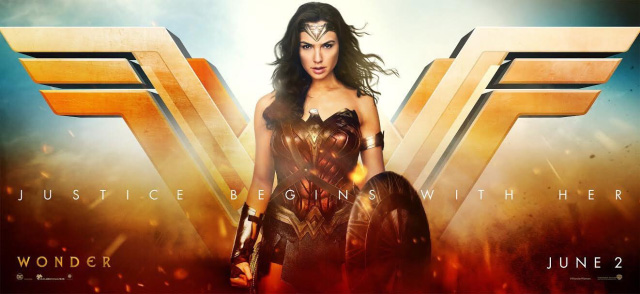Both critics and geeks have been
justifiably nervous that the first female-fronted superhero film of our
modern-day fanboy renaissance is being brought to us by Zach Snyder and Warner
Bros’ DC Comics cinematic universe; the same universe that’s brought such us large-scale
disappointments as “Man of Steel,” as well as last year’s “Batman v Superman:
Dawn of Justice” and “Suicide Squad.” For many years, Marvel producer Kevin
Feige was curiously noncommittal about the possibility of funding a
female-driven entry into his web of interconnected action films, but in a rush
to catch up with the successful Disney entity, Warners has released a “Wonder
Woman” film that breaks the tradition of their current output by being surprisingly good.
We were first introduced to Gal
Gadot’s sword and shield wielding Amazonian as a peripheral character in
“Batman v Superman,” but here director Patty Jenkins and screenwriter Allen
Heinberg focuses in on her origin and gives us the emotional and philosophic
context we need to truly care about the admittedly cheesy character. This time
we meet Princess Diana as a trained warrior of the all-female demigod tribe created
by Zeus to protect the human race. After the tribe has spent years hiding and
training in their magically hidden island of Themyscira, awaiting for the day
the Greek god Aries returns to finish them off, Diana discovers a human WWI spy
named Steve Trevor (Chris Pine) who crash lands in their ocean. When he tells
her of the devastations and atrocities he’s fighting in his home-world, Diana
travels back with him to find and kill a German military leader named Erich
Ludendorff (Danny Huston), who she suspects is a disguised Aires orchestrating
the stage for human destruction.
Jenkins, who was previously attached
to direct Marvel’s “Thor: The Dark World” before leaving the project over
disagreements with the studio, has a firm hand on the pulpy tone of the source
material. The first third of the film plays like a large-scale episode of
“Zena: Warrior Princess” while the rest resembles the popcorn-flavored fantasy
of adventure flicks like “Raiders of the Lost Arc” and “The Rocketeer.” These
worlds are joined more seamlessly than one might think and the Jenkins’ focus
on Diana/Wonder Woman as a sturdy center of consciousness allows us to accept
and even admire her idealistic world-view when it comes to altruistic justice.
Gadot and Pine also bring a lot of
life and pathos to their characters and unlike the DC’s recent cinematic
output, this film allows for scenes to breathe and build to moments of action
and suspense instead of always rushing to the next big set-piece. Much like
Kenneth Branagh’s first “Thor” movie, “Wonder Woman” also includes
fish-out-of-water humor as the warrior princess tries to wrap her head around
the peculiarities of turn of the century Europe.
Given that so much of this movie is
entertaining and easy to invest in, it’s unfortunate that Patty Jenkins
attended Zach Snyder‘s school of hyper-stylized action direction. The battle sequences are filmed using his
signature slow-mo-speed-up technique, occasionally pausing the action to frame
corny, self-satisfied, music-video glory shots. The final battle between Wonder
Woman and Aries separates Diana from the emotionally-driven war sequences, only
so that the film can pay off the genre fans with an overpowered comic-book
boss-battle, wherein the foes are shooting lightning out of their hands and trucks
and building are flung back and forth. With that noted, it’s a common mistake
for these kinds of movies to over-climax and I can’t fault Jenkins, who’s never
directed a film on this budget, for sliding into an easy aesthetic trope.
“Wonder Woman” knows what works in
the superhero origin drama and it plays its cards carefully. Unlike the
previous entries in the misbegotten DCU, it doesn’t try to cram in loads of
exposition and tangential DC Comics world-building for the sole purpose of setting
up future sequels, remembering to succeed on its own as a standalone adventure.
Many will write about the gender politics of the film and it is significant
that this movie exists as it does for young girls to root for a hero of their
own, though Pine and Gadot’s awkwardly suggestive banter sometimes undercuts
the strong feminist themes. The film is a hair too long and slips into
headache-inducing destruction by its end, but too much of it works too well for
me to criticize the picture for simply leaning into familiar genre tropes.
Grade: B+
Originally Published in the Idaho State Journal/Jun-2017
Listen to this week's episode of Jabber and the Drone to hear more conversation about "Wonder Woman."

No comments:
Post a Comment